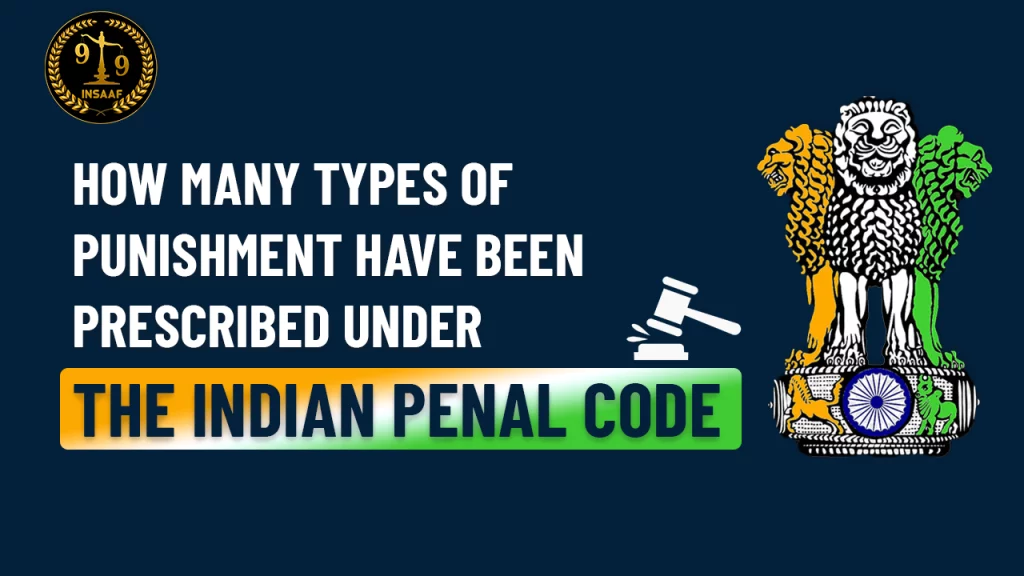

Online Legal Advice from Insaaf99® Online Lawyer Consultation in India


Online Legal Advice from Insaaf99® Online Lawyer Consultation in India

The Indian Penal Code or the IPC acts as a cornerstone of legal framework which defines and governs the scope of criminal offenses and their corresponding penalties in India. Over the years, the IPC has undergone numerous amendments and interpretations for adapting to the evolving social, political and technological landscape of the nation.
Let's look at the fundamental aspects of punishment under IPC as described in the IPC.
The Indian Penal Code is the principal criminal code of India. The IPC was enacted in 1860 during British colonial rule. IPC is a comprehensive legal framework that defines and punishes criminal offenses in our country. It also provides a uniform set of laws which are applicable to all Indian states and union territories. The uniformity helps in promoting fairness and justice across the country.
The IPC categorizes the different crimes under different sections, each one addressing a specific offense and also prescribes corresponding punishment under IPC or penalties. It covers a wide range of criminal acts, including offenses against the state, public tranquility, property and persons. The IPC also includes provisions for general exceptions, self-defense and the mitigation of punishment under IPC under certain circumstances.
The Indian Penal Code serves as the backbone of the Indian legal system as it guides the law enforcement agencies, prosecutors and the courts in adjudicating criminal cases. It plays an important role in upholding the rule of law as it protects the citizens' rights. It maintains social order and harmony across the nation. The IPC continues to play a fundamental role in safeguarding the integrity and stability of our country's justice system.
The Indian Penal Code (IPC) is divided into different sections dealing with different criminal offenses and their corresponding punishment under IPC. Some of the essential sections of the IPC are as follows:
The section 299 and 300 deals with the definition and punishment under IPC for different forms of murder including homicide and other various degrees of murder.
The section 307 addresses attempted murder and provides punishment for attempting to cause death or hurt to anyone.
The sections 376 deals with offenses related to rape. Under this, there are also specifications for punishment under IPC for committing the heinous crime.
The sections 420 pertains to offenses of cheating and dishonestly inducing delivery of property. It punishes those who engage in fraudulent practices.
The section 498A covers the cases of cruelty by a husband or his relatives towards a married woman. It also criminalizes dowry harassment.
The section 304A deals with cases of causing death by negligence, imposing penalties for acts resulting in unintentional deaths.
The section 377 pertains to unnatural offenses including consensual homosexual activities.
The section 354 addresses offenses of assault or criminal force on a woman with the intent to outrage her modesty.
The section 511 includes punishment for attempting to commit offenses punishable with imprisonment or life imprisonment.

The Indian Penal Code describes the different kinds of punishment pertaining to different criminal offenses. The punishments are classified into several categories, depending on the severity of the crime. Some of the main types of punishment as per the IPC are as follows:
Death penalty is the most severe punishment in which the convicted person is sentenced to death. A death penalty is applicable to specific offenses like murder with rarest of rare cases.
Under this, the offenders may be sentenced to imprisonment for varying durations such as life imprisonment, rigorous imprisonment (hard labor) or simple imprisonment (without hard labor).
A simple monetary penalty can also be imposed on the offender. However, the fine may vary as per the nature and severity of the offense.
Under this, the court may order the forfeiture of property acquired through criminal activities.
Offenders may be required to compensate the victim or restore the property wrongfully obtained or damaged.
The court may release a first-time offender conditionally under the supervision of a probation officer.
The offenders may be ordered to perform community service as a part of their punishment under IPC.
This is a form of imprisonment wherein the convict is isolated from other prisoners and kept alone in a cell.
In certain specific cases, whipping or lashing may be imposed as a form of corporal punishment.
An exile is rarely used. It involves sentencing the offender to live in a specified area away from their original residence.
It is important to note that not all types of punishments are applicable to every offense. The nature and severity of the crime along with certain other factors determine the type and duration of punishment under IPC which can be imposed on the convict by the courts in accordance with the Indian Penal Code.
On a concluding note, the Indian Penal Code deals with a wide range of punishments for maintaining the rule of law in India. The IPC framers recognized the importance of fitting the punishment under IPC to the crime which also considers various factors such as the severity of the offense, its impact on society and the potential for reform. From monetary fines to life imprisonment, the IPC covers a comprehensive range of punitive measures.
The implementation and interpretation of these laws also play an important role in ensuring fairness and equity. The criminal justice system should consistently uphold the principles of due process, impartiality and rehabilitation, while also respecting the fundamental rights of individuals at the same time.
As the society evolves, it becomes essential to continually assess and update its laws, adapting them to the changing needs and expectations of the people. The Indian Penal Code serves as an important aspect in safeguarding the rights of citizens and maintaining law and order in our country.
Also Read